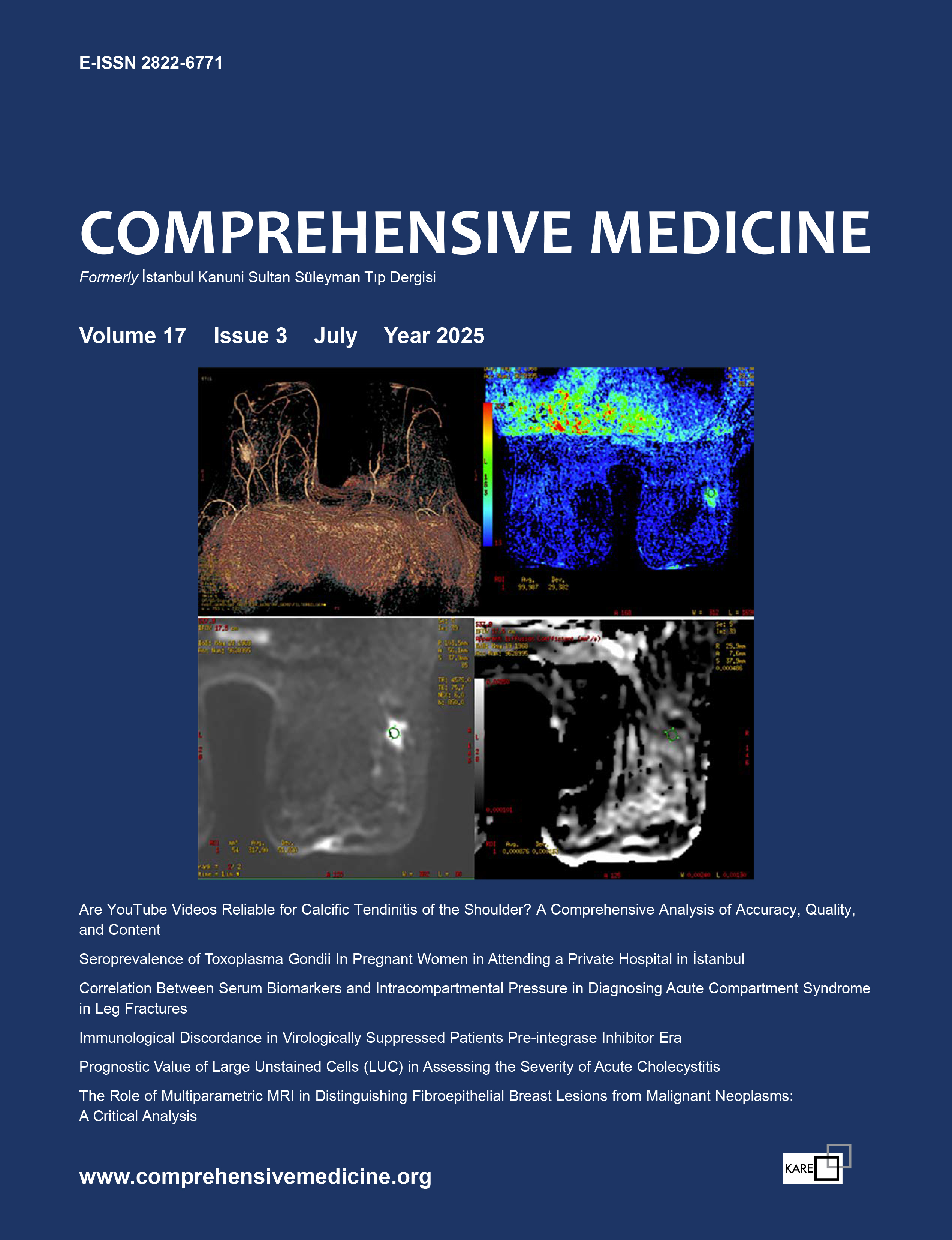Correlation Between Serum Biomarkers and Intracompartmental Pressure in Diagnosing Acute Compartment Syndrome in Leg Fractures
Saurabh Jha1, Shiv Shanker Tripathi1, Rajiv Ratan Singh1, Swagat Mahapatra3, Utkarsh Kumar Srivastava1, Sachin Kumar Tripathi4, Pradeep Kumar Yadav21Department of Emergency Medicine, Dr. Ram Manohar Lohia Institute of Medical Sciences, Lucknow, India2Department of Orthopaedic Surgery, Dr. Ram Manohar Lohia Institute of Medical Sciences, Lucknow, India
3Department of Forensic Medicine and Toxicology, King George's Medical University, Lucknow, India
4Department of Forensic Medicine and Toxicology, Dr. Ram Manohar Lohia Institute of Medical Sciences, Lucknow, India
INTRODUCTION: Acute Compartment Syndrome (ACS) is a serious complication of leg fractures that requires timely diagnosis and intervention. While intracompartmental pressure monitoring remains the gold standard for diagnosis, the role of serum biomarkers as non-invasive diagnostic tools is gaining interest. This study investigates the correlation between serum biomarkers and intracompartmental pressure in diagnosing ACS. To evaluate the correlation of serum biomarkers with compartment pressure monitoring in suspected ACS in fractures of the leg and its medico-legal significance.
METHODS: This prospective observational study included 60 patients with leg fractures suspected of developing ACS. Serum biomarkers were measured, including creatine kinase, potassium, lactate, bicarbonate, and chloride. Simultaneously, intracompartmental pressure was recorded using a pressure monitoring device. Data were analysed using descriptive statistics, correlation coefficients, and binary logistic regression to evaluate the association of biomarkers with intracompartmental pressure.
RESULTS: Serum biomarkers, particularly creatine kinase and lactate, offer valuable support in diagnosing ACS in leg fractures, complementing intracompart-mental pressure monitoring. Integrating these biomarkers into diagnostic protocols can improve early detection, especially in resource-limited settings. This research underscores the medico-legal significance, as accurate ACS identification prevents legal issues arising from delayed intervention and patient harm.
DISCUSSION AND CONCLUSION: Serum biomarkers, particularly creatine kinase and lactate, show promise as adjuncts to intracompartmental pressure monitoring for diagnosing ACS in leg fractures. Incorporating these biomarkers into diagnostic protocols may enhance early detection, particularly in resource-limited settings. Further studies are needed to validate these findings and establish clinical thresholds. This research highlights the medico-legal significance of serum biomarkers in diagnosing ACS in leg fractures. Elevated creatine kinase and lactate levels, along with clinical findings, provide crucial evidence for timely diagnosis and treatment. Accurate identification of ACS can prevent legal implications related to delayed intervention and patient harm.
Correlation between serum biomarkers and compartment pressure in diagnosing acute compartment syndrome in leg fractures
Saurabh Jha1, Shiv Shanker Tripathi1, Rajiv Ratan Singh1, Swagat Mahapatra3, Utkarsh Kumar Srivastava1, Sachin Kumar Tripathi4, Pradeep Kumar Yadav21Department Of Emergency Medicine, Dr. Ram Manohar Lohia Institute Of Medical Sciences, Lucknow, India.2Department Of Forensic Medicine And Toxicology, Dr. Ram Manohar Lohia Institute Of Medical Sciences, Lucknow, India.
3Department Of Orthopaedic Surgery, Dr. Ram Manohar Lohia Institute Of Medical Sciences, Lucknow, India.
4Department Of Forensic Medicine And Toxicology, King George
GİRİŞ ve AMAÇ: Acute Compartment Syndrome (ACS) is a serious complication of leg fractures that requires timely diagnosis and intervention. While compartment pressure monitoring remains the gold standard for diagnosis, the role of serum biomarkers as non-invasive diagnostic tools is gaining interest. This study investigates the correlation between serum biomarkers and compartment pressure in diagnosing ACS. To evaluate the Correlation of Serum Biomarkers with Compartment pressure monitoring in suspected acute compartment syndrome in fractures of the leg and its Medicolegal significance.
YÖNTEM ve GEREÇLER: This prospective observational study included 60 patients with leg fractures suspected of developing ACS. Serum biomarkers were measured, including creatine kinase, potassium, lactate, bicarbonate, and chloride. Simultaneously, intracompartmental pressure was recorded using a pressure monitoring device. Data were analyzed using descriptive statistics, correlation coefficients, and binary logistic regression to evaluate the association of biomarkers with compartment pressure.
BULGULAR: Serum biomarkers, particularly creatine kinase and lactate, offer valuable support in diagnosing Acute Compartment Syndrome (ACS) in leg fractures, complementing compartment pressure monitoring. Integrating these biomarkers into diagnostic protocols can improve early detection, especially in resource-limited settings. This research underscores the medicolegal significance, as accurate ACS identification prevents legal issues arising from delayed intervention and patient harm.
TARTIŞMA ve SONUÇ: Incorporating these biomarkers into diagnostic protocols may enhance early detection, particularly in resource-limited settings. Further studies are needed to validate these findings and establish clinical thresholds.This research highlights the medicolegal significance of serum biomarkers in diagnosing Acute Compartment Syndrome (ACS) in leg fractures. Accurate identification of ACS can prevent legal implications related to delayed intervention and patient harm.
Manuscript Language: English






















